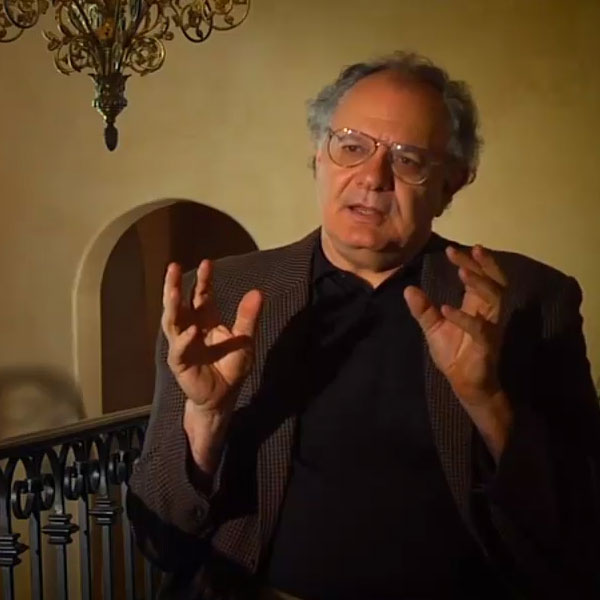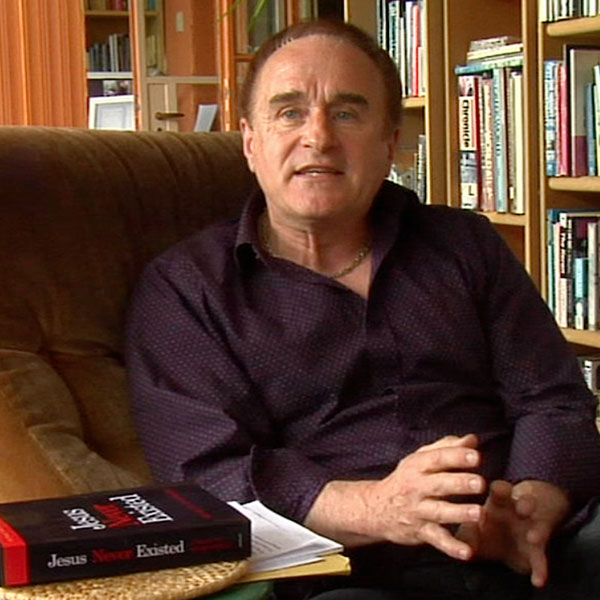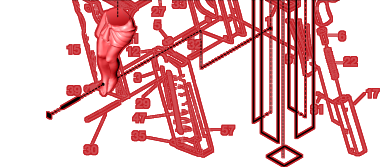ABOUT
TO UNDERSTAND OUR CULTURE WE HAVE TO UNDERSTAND THE BEGINNING...
The calendar we use today marks the life of Jesus Christ as the beginning of a new chapter in Western civilisation, a new era inspired by Christ's message of love, charity, humility, peace, and justice. But established history tells us that Christianity became entangled in politics, wealth, violence, and empire because the institutional religion strayed from the moral teachings of its founder. How did it go so wrong?
The latest in Biblical scholarship has now uncovered new evidence that provides a disturbing explanation: Christianity never strayed; Jesus Christ is a fabricated cover story for an Imperial psychological warfare operation born out of the First Jewish-Roman War in the first century.
Far-fetched and absurd? The quality of the evidence we'll be presenting may surprise you.
AN EXPOSÉ ON CHRISTIANITY WHOSE TIME HAS COME
Join us for a one-day symposium that will provide a unique insight into how the ruling classes, from the Caesars of the past to the public relations firms working for governments and high finance today, have maintained power and an unending stealth class war by weaponising our own imagination against us. This is sure to engage not just students of religion and history, but also those interested in psychology, politics, and social justice.
In attendance will be our guest speakers Joseph Atwill and Kenneth Humphreys. We are also proud to feature the European premiere of the groundbreaking documentary Caesar's Messiah: The Roman Conspiracy to Invent Jesus directed by Fritz Heede.
SPEAKERS

JOSEPH ATWILL
author of "Caesar's Messiah"
VISIT JOSEPH ATWILL'S BLOG
As a youth in Japan Atwill attended a Jesuit military academy, where most of his school day was spent studying Greek, Latin, and the Bible. In later years, he continued studying hundreds of books on the origins of Christianity, including the Dead Sea Scrolls. Recently he wrote a paper with Robert Eisenman on the dating of the Scrolls. Atwill's book Caesar's Messiah: The Roman Conspiracy to Invent Jesus was published by Ulysses Press in 2006, becoming a best-selling work of religious history in the US in 2007. Its German translation has also achieved No. 1 Best Seller status.

KENNETH HUMPHREYS
author of "Jesus Never Existed"
VISIT KENNETH HUMPREYS' WEBSITE
Humpreys holds a Master's degree from the University of Essex in history and social sciences, a post-graduate pedagogic certificate from the University of Leicester, and a higher national certificate in business studies. He taught for many years in the UK and abroad. Religion, and in particular the claims of Christianity, have been a life-long interest. His book Jesus Never Existed, published in 2005 by Iconoclast Press, currently ships to 30 countries. His website receives more than a million visitors a year. He is now fully occupied as a writer, radio broadcaster, and public speaker, and campaigns energetically against the tide of resurgent superstition and unreason.
FILM
DIRECTOR'S STATEMENT
When we were first introduced to the book Caesar’s Messiah, our response to the idea that the Romans wrote the New Testament in order to control the masses of the day was equal parts belief and disbelief. The thesis made a lot of sense, and yet it seemed too outrageous in the face of the gigantic numbers of people who hold Christianity sacred and Jesus as a historic figure.
After a three-year journey of studying this subject more deeply and becoming familiar with the works of many scholars on the origins of Christianity, we feel that the thesis has much merit and deserves to be seriously considered as a likely possibility of what actually occurred in history 2000 years ago. Though we didn’t wish to dismiss the positive teachings of Christianity, it is the history and politics of the way the religion came about that we feel are the real issue.
The challenge then became how to approach such a scholarly and academic topic as the analysis of ancient texts, in a visual format in order to keep the attention of the audience. Thanks to the artistic cinematography of Fritz Heede and Marisa Maldonado, and the inclusion of classic paintings to illustrate scenes from the time period, we were able to avoid the pitfalls of re-enactments, which can tend to feel too concrete and forced of an interpretation of an ancient era. We were also blessed with interesting and passionate scholars who are a far cry from dry academics, being on the cutting edge of scholarship and in many instances challenging to the academic world.
As production progressed, we couldn’t help notice the immediate relevancy of the Caesar’s Messiah thesis to the unfolding of current day political affairs. It is our hope that audiences will open up to the possibility that the history written in official books is not always actual fact, and that religion is often used as a political tool to control the populace, even to this day.
DOCUMENTARY SYNOPSIS
The origin of the Christian religion has been a subject steeped in mystery for nearly 2000 years. Who was Jesus? Is he an historical character? Who wrote the Gospels? Why are they written in Greek? Why did they have a pro-Roman and anti-semitic perspective? Why was the religion headquartered in Rome? Caesar’s Messiah: The Roman Conspiracy to Invent Jesus is a documentary based on the best‐selling religious studies book by Joseph Atwill. Atwill is one of a number of scholars today from all around the world, who are questioning the historic facts behind these mysterious origins of Christianity. When examining the actual history of this era, many of the answers provided by the Church do not hold up to rigorous scrutiny. No doubt, Christianity has done a lot of good for the world, but a lot of bad has come from its most dogmatic believers, who create wars, hatred, and other harm under the disguise of religion. In studying how Christianity emerged, the seven controversial Bible scholars featured in this film agree that it was used as a political tool to control the masses of the day, and is still being used this way today. For example, support for the wars in the Middle East is preached to Evangelical Christians as a way to speed up the coming of the End of Days. Maybe we need to expand the possible answers about how Christianity originated, and deeper questions need to be asked. Maybe we need to examine what political motives were behind the formation of the Christian religion?
The documentary begins with a brief history of the political and religious climate of Judea in the first century CE – the era during which Christianity emerged. Judea was occupied by the Roman Empire, which required them to worship Caesar as a god. The Jews found this blasphemous, and they waged constant rebellions against the Empire. Their religious scriptures prophesied that a militaristic warrior Messiah would defeat the Romans and lead the Jews to liberation. A string of numerous Messiahs presented themselves to lead the people in war against Rome, only to be defeated and crucified – a customary Roman punishment for insurgents of the day. However, the Roman government was growing weaker from over a century of increasingly corrupt rule by the Julio‐Claudian dynasty — the last emperor of this lineage being Nero, who was bankrupting the Empire with his self‐indulgence. In their greatest victory, the messianic Jews finally succeeded in burning Rome and driving the Romans out of Judea. This caused Nero to call upon his best military men, the Flavians – Vespasian and his son Titus — to crush the rebellion for good. The Flavians succeeded not only in destroying the Jewish towns of Galilee and their temple in Jerusalem, but after Nero was deposed and committed suicide, they seized the throne through a military coup and took over reign of the Roman Empire itself. Under the Flavians, the Empire flourished, and many great monuments were built including the famous Coliseum. In order to pacify the Jewish rebellion, they captured and burned all the Jews’ scriptures. It is around this time that a new literature emerged with the story of a very different Jewish Messiah – one who preached “give to Caesar what is Caesar’s”, “turn the other cheek”, and “love your enemy”.
The second half of the documentary focuses on the documents the Flavians left behind which prove their authorship of the Gospels. The Bible scholars deconstruct the Gospels and the character Jesus, showing that they are based on archetypes found in the ancient pagan mystery schools and in earlier Jewish literature. Much of the teachings of Christianity are traced back to the writings of Philo of Alexandria — who was combining Jewish scripture with Greek pagan beliefs — and Stoicism, a philosophy promoted by the Flavians. When the Flavians seized control of the Roman Empire, they needed to legitimise their rule, so they had their Jewish court historian Josephus (originally Yosef ben Matityahu who adopted the name Titus Flavius Josephus) create a large body of work which became the only official history we have of the Jewish-Roman War.
Bible scholar Joseph Atwill noticed many parallels between this historic account of the war and the events in the life of Jesus in the Gospels. Through his study of the ancient Greek texts and his discovery of an antiquated Hebrew literary genre, he found dozens of parallels between the Jesus story and the war history that occurred in the exact same sequence. This shows that the events of Jesus’ life which supposedly took place forty years earlier, were actually all dependent on the events in the military campaign of the Roman Caesar Titus Flavius. Ancient texts were much more allegorical, multi-layered and complex than today’s writing, and when you read the Gospels and the histories of Josephus side by side, a new meaning arises which reveals the authors of the Gospels to be the Roman Flavian Caesars, their co-conspirators, and their literary team.
Along the way, the Bible scholars show how the Roman Imperial Cult — set up to worship Caesar as a god — formed the basis for the Roman Catholic Church, and that some of the Church’s first saints were members of the Flavian court. Atwill also shows how the “second coming of the Christ” referred to a historical event that already occurred. Featuring scholars Joseph Atwill, Robert Eisenman, John Hudson, Ken Humphreys, Rod Blackhirst, Acharya S / D.M. Murdock, and Timothy Freke, this ground-breaking documentary not only gives us a revolutionary new understanding of the origins of Christianity, but shows how the political use of religion is still affecting our personal lives today. We currently live on the brink of an immense paradigm shift, and this modern time is very parallel to the era in which Christianity emerged. Studying this ancient era can give us the much-needed perspective for coming up with solutions to today’s problems, so we can create the better world that we envision.
VENUE

CONWAY HALL
As the home of the Conway Hall Ethical Society, an outspoken educational charity opposed to religious dogma with a 200 year history, Conway Hall is an opportune setting for the Covert Messiah Symposium. A beautiful lecture and concert hall built in 1929 and listed as a Grade II site by English Heritage, the building is a landmark of London's independent intellectual, political, and cultural life and is considered to be the historic home of British humanism. "To Thine Own Self Be True," the creed of the Society, proudly graces the main hall above the stage, lit by skylight.
Conway Hall is named in honour of Moncure Daniel Conway, an American clergyman and early human rights advocate and activist who came to London during the American Civil War. He was a prolific writer who published over seventy books and journals including an oft-cited biography of Thomas Paine. Beginning a career as an ordained Methodist, the faith of his wealthy Virginian slaveholding parents, Conway freed himself from many of the dogmas surrounding him and became an active abolitionist (even leading 31 of his own father's slaves on a dangerous train ride to freedom in southwestern Ohio where he established what later became known as the Conway Colony). The development of his philosophical and moral outlook was very much influenced by his mentor Ralph Waldo Emerson, which eventually changed from transcendentalism to a more secular and humanistic free thought. He counted many luminaries of the late nineteenth century as his friends, including Walt Whitman, Mark Twain, Elizabeth Caddy Stanton, Andrew Carnegie, Charles Dickens, Robert Browning, Thomas Carlyle, Charles Lyell, and Charles Darwin.
GETTING TO CONWAY HALL
By Underground - Holborn Station (Central and Piccadilly lines) is 5 minutes walk away. Chancery Lane (Central line) and Russell Square (Piccadilly line) stations are within a 10 to 15 minute walk.
By Bus - Route 98 terminates in Red Lion Square. Routes 19, 38, 55 & 243 pass Conway Hall's back entrance on Theobalds Road. There are many other buses with routes along Holborn, Grays Inn Road or Southampton Row / Kingsway stopping within 5 minutes walk of the Hall. See the Transport for London website to plan your journey.
By Car - Parking spaces are very few. There is no unrestricted on-street parking and only limited metered parking available in the area with charges applying until 1.30pm on the day of the Symposium. Many nearby spaces are designated for residents only.
PROGRAMME
Saturday, 19 October 2013
Morning |
|
| 09:15 | Doors open |
| 09:45 | Introduction and Opening Remarks |
| 10:00 | Film screening of Caesar's Messiah |
| 11:30 | Lecture: Kenneth Humphreys |
| 12:15 | Lunch break |
Afternoon |
|
| 13:00 | Extended interviews from Caesar's Messiah |
| 13:30 | Lecture: Joseph Atwill |
| 14:15 | Tea break |
| 14:30 | Lecture: Joseph Atwill |
| 15:00 | Speaker's Forum and Q & A |
| 16:00 | Closing Remarks & Book Signing |
| 17:00 | Doors close |

